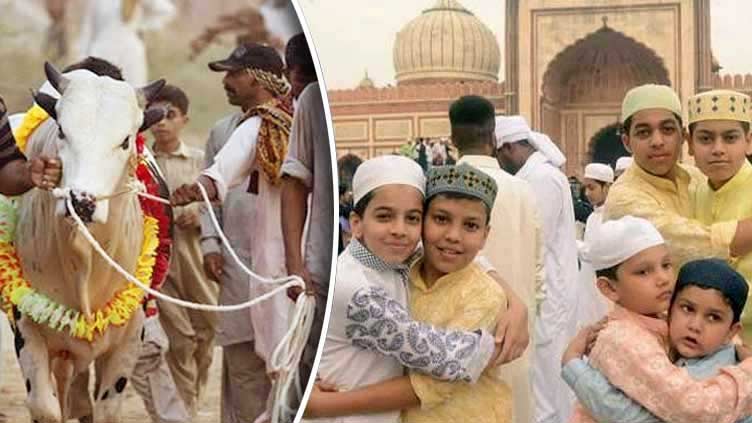Eidul Azha - the festival of sacrifice

Pakistan
The festival traces its origins to the ancient tale of Prophet Ibrahim (AS)
By Arooj Anmol
In the Islamic calendar, the 10th of Zilhajj marks a momentous occasion celebrated by Muslims worldwide: Eidul Azha, also known as the Feast of Sacrifice.
HISTORICAL BACKGROUND
Rooted deeply in religious significance, this festival traces its origins to the ancient tale of Prophet Ibrahim (AS).
According to tradition, Ibrahim was tested by God who commanded him in a dream to sacrifice his beloved son, Ismail.
As Ibrahim prepared to fulfill this divine command, God intervened, replacing Ismail with a ram, affirming Ibrahim's devotion and providing a ram for sacrifice instead.
EID DAY
Eidul Azha honours this profound act of faith and obedience. It begins with the Eid prayers at mosques, where Muslims gather in the early hours to seek blessings and commemorate the spirit of sacrifice.
After prayers, families across the globe engage in the symbolic act of qurbani, sacrificing animals such as cows, goats, lambs, and camels.
The meat from these sacrifices is then distributed among the less fortunate, relatives, neighbours, ensuring that all can partake in the joyous festivities and feast on this day.
EID PREPARATIONS
Preparations for Eidul Azha start weeks in advance. People from all walks of life eagerly visit bustling cattle markets, carefully selecting animals that fit their budget and preference.
For many sellers, these animals represent a year's worth of hard work and livelihood.
Most of the people purchase sacrificial animals months before just to spend some time and pamper their sacrificial animals. They adorn them with colourful accessories and stroll with them on streets.
The significance of Eidul Azha extends beyond religious rituals. It is a time when families reunite, bridging distances that separate them throughout the year.
From bustling city centres to quiet villages, transportation hubs buzz with activity as people journey home to celebrate with loved ones.
Special buses and trains are run, ensuring smooth travel for those making the journey back to their roots.
Yet, not everyone can return home. Some remain in cities, fulfilling work commitments or sending remittances to ensure their families can partake in the festivities.
Overseas, expatriates long to be with their loved ones, constrained by financial limitations that prevent them from experiencing Eid in their homeland.
EID PARTIES
As the day unfolds, neighbourhoods come alive with the aroma of sizzling barbecues and elaborate meat dishes.
Families and friends gather, sharing laughter and delicious cuisines like Kaleji, Mutton Pulao, Roast Raan and Dum Pukht.
The air is filled with joy as children run about, adorned in new clothes and eagerly awaiting their share of Eid gifts.
However, amidst the revelry, there are poignant moments of reflection. Some families mourn loved ones lost, their absence casting a shadow over the festivities.
For others, Eid is a stark reminder of economic hardships, where the luxury of enjoying meat dishes remains out of reach.
Eidul Azha also underscores the importance of compassion and community. It is a time for those who are more fortunate to reach out to the less privileged, sharing their blessings and ensuring that everyone can partake in the spirit of Eid.
From distributing meat to donating animal hides for charitable causes, the day fosters a sense of solidarity and generosity.
In essence, Eidul Azha embodies the core values of Islam: faith, sacrifice, and unity.
It is a celebration that transcends borders and cultures, uniting millions in a shared expression of devotion and gratitude. As the day draws to a close, families retire to their homes, hearts full from the day's festivities and minds set on the blessings that lie ahead.


